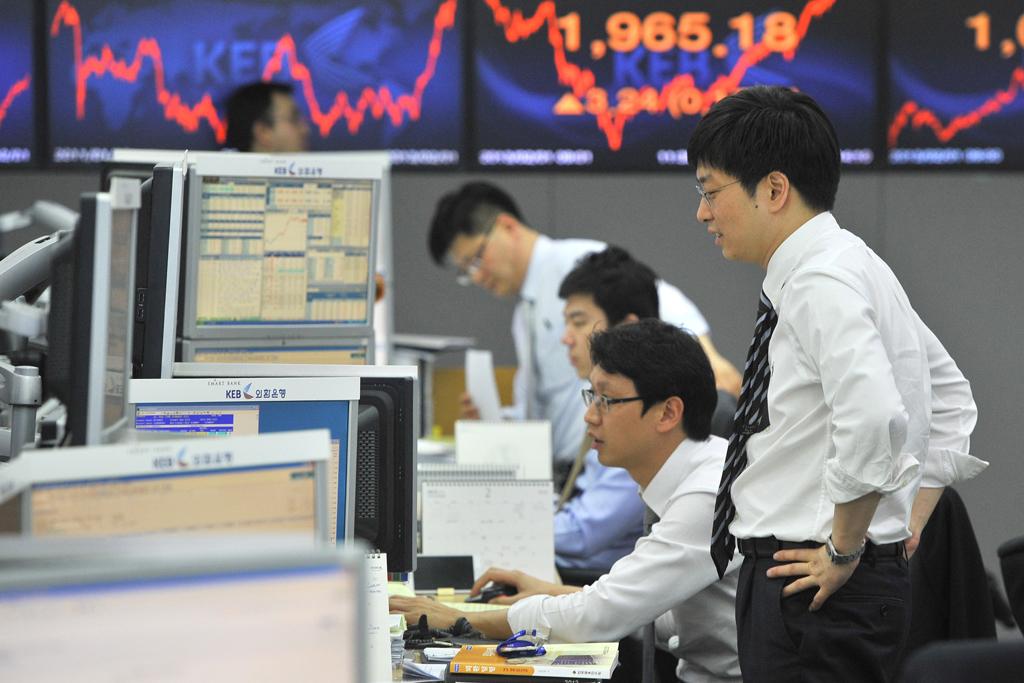South Korean stocks whacked as war threat looms
This photo taken on Feb. 1, 2013, shows currency traders monitoring exchange rates in a dealing room at the Korea Exchange Bank in Seoul, South Korea. A surging won and waning yen are eroding the bottom lines of South Korea’s export powerhouses.
Increasing tensions with North Korea, a strengthening won versus the yen and weak economic growth — things are not looking great for South Korean equities, the second worst performing stock market in Asia this year.
The benchmark Kospi stock index, which hit a three-week low on Tuesday on North Korea worries, is down about 0.2 percent in the year to date. The fall is by no means steep but the performance of shares in Asia's fourth largest economy certainly looks poor when compared with an 18 percent surge in Japanese shares and a near 4 percent gain in shares in Taiwan this year.
The underperformance also comes against a backdrop of generally improving sentiment in global financial markets that has helped send stocks in the United States and Europe to multi-year highs in recent weeks.
"What we've seen is that South Korea has lagged other markets. If you look at the reasons — North Korea concerns are back and that's weighing on the market," said Christian Nolting, head of discretionary portfolio management and strategy for Asia-Pacific at Deutsche Bank in Singapore.
(Read More: South Korea: We'll strike back if North attacks)
"The other point to understand is that the won has risen against the yen and many South Korean firms compete with Japanese companies," he told CNBC Asia's "Cash Flow" on Wednesday.
Geopolitical tensions have come back to the fore in the region since North Korea conducted a third nuclear test last month, and recent weeks have seen a marked escalation in the rhetoric from Pyongyang.
North Korea, for instance, has vowed to end non-aggression pacts with the South, while South Korea's new president Park Geun-hye warned earlier this month that the situation in the north was "very grave."
"I think we've got to expect something at the very least a short range missile test. What we are really worried about is something a bit more serious," Andrew Gilholm, head of analysis for Asia-Pacific at Control Risks, said on CNBC earlier this week.
He added that another concern, if the situation deteriorated, was that the South Korean response could be "harsher" this time.
Analysts say that while the heightened tensions with North Korea could further unsettle South Korean markets in the short-term, there were a few supportive factors.
(Read More: South Korea inflation eases, gives room for rate cut)
In terms of the North Korea impact, Eric Fishwick, CLSA's head of economic research in Hong Kong, said history suggested that Seoul's stock market would weather the storm.
"I don't think the flare-up in North Korean tensions is that different from what we've seen in the past decade," he said. "It should have zero long-term impact on the value of South Korean assets."
Deutsche Bank's Nolting listed the reasons for why he remained upbeat about the outlook for South Korean shares: "The yen will continue to weaken but we have seen most of that trade. We also have a new government so we could get some positive policy action, and the Bank of Korea still has some reason to cut interest rates."
The yen has weakened about 16 percent against the won since last November amid expectations of aggressive monetary easing in Japan, falling to its lowest level in more than four years last week.
(Read More: Weak yen adds to woes confronting South Korea's Park)
South Korea plans to introduce a stimulus package to boost the economy, Reuters quoted a senior government official as saying on Wednesday.
South Korean exports barely grew in the first two months of this year, fanning worries about the country's export-dependent economy.
"The biggest factors for international investors in South Korea going forward are how far the currency markets take the yen and what happens with the US growth cycle," said CLSA's Fishwick, adding that further weakness in the yen was likely to be limited given the rapid decline in the Japanese currency.
"And we are more confident about the outlook for the global economy so the growth outlook for South Korea is looking more credible," he added. "That will be good for South Korean exporters, who have a large weighting in the Kospi."
More from our partners at CNBC:
CNBC: Euro dips, Aussie lifts, Cyprus talks ahead
CNBC: Nigerian stocks: High risk, high reward?
CNBC: Goldman Sachs: FTSE to hit 7,200
CNBC: Asia falls on caution; Hong Kong leads losses
CNBC: Roubini analyst: Fed won't stop printing money until 2014
